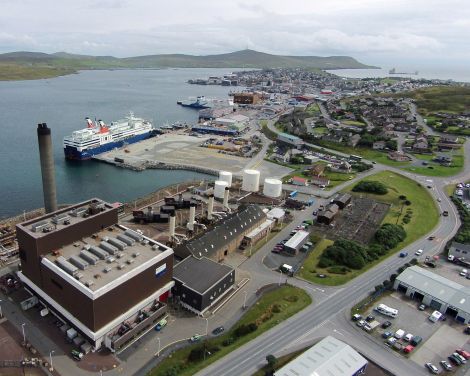News / Lerwick Power Station to stay open until 2025
PLANS to serve Shetland’s energy needs with a 60MW subsea cable from the Scottish mainland have been rejected by Ofgem following a relaxation of emissions targets and a government pledge of support for island wind farms.
Scottish and Southern Energy Networks (SSEN) confirmed that security of supply could be guaranteed until at least 2025 through a combination of its Lerwick Power Station plant and “additional supporting measures”.
That can be done at a cost “significantly below” the estimated £581.7 million cost over the 20-year lifetime of the 260km cable, which would have been laid between Dounreay and Scalloway.
Ofgem said it would give more details on its decision to reject National Grid Shetland Link Ltd and Aggreko’s joint plans for the 60MW cable next week.
A change made in July at EU level relating to the industrial emissions directive means more stringent emissions targets due to affect the power station from 2020 have now been pushed back to 2030.
The UK Government, meanwhile, confirmed in October that wind farms on remote islands would be able to compete with offshore developments in the next Contract for Difference (CfD) auction in 2019.
That could potentially be the spur for a long-mooted 600MW interconnector cable which, unlike the proposed 60MW link, would have sufficient capacity to export energy from larger scale renewables such as Viking Energy’s proposed 103-turbine windfarm.
It follows stern criticism from Shetland Islands Council of the proposal for a smaller cable that put the “very future of the islands’ community and economy at stake”.
SIC development committee chairman Alastair Cooper said he was “delighted” that “common sense has prevailed”.
“Whatever size of cable we get for Shetland, I want it to be a cable that can transmit both ways,” he said. “The problem we had with the National Grid solution was that it was a one-way cable; it could only import, it couldn’t export.”
Become a member of Shetland News
He said a two-way cable connecting to the mainland National Grid near Wick was the solution and “the size of that [cable] is an item for debate”.
“Do we want 60MW, do we want 200MW? What size of cable would best suit Shetland’s micro generation needs? I do not have an answer to that. But what I do want to see is a cable that can work both ways.”
Shetland MSP Tavish Scott said it “looks like a change in position by Ofgem, who were gung-ho in favour of the cable and diesel generator backup plan. So this is first and foremost a sensible outcome for the staff at Lerwick Power Station.”
He added that he would be speaking to Ofgem as he wants to know “what they now plan to do in securing Shetland’s long term power needs”.
Prospective windfarm developers Viking Energy Shetland welcomed the clarity in Ofgem’s announcement.
Viking’s head of development Aaron Priest said: “It remains vital for Shetland’s economic future that we’re allowed the chance to diversify and develop a renewable energy industry.
“We have an endless resource of wind, wave and tide and the Shetland community should get to use it to generate new jobs and income. The UK Government’s decision to allow island projects to participate in the next CfD round was pivotal and engagement with government on the detail is ongoing.”
Referring to the plans to keep the power station open until 2025, an Ofgem statement issued on Thursday morning said it “can be done at a cost that is significantly below that of the National Grid Shetland Link Ltd and Aggreko solution.
“This also allows for the possibility of further savings being realised if a more integrated solution comes forward, notably if a transmission link is needed following the next CfD round.”
Ofgem’s head in Scotland, Kersti Berge, told Shetland News the decision would allow the regulator to assess what happens in relation to renewables in the next couple of years before settling on a long term solution.
“One option put in play is there may be a significant windfarm development in Shetland that might need a big export cable,” she said. “That might allow us to look at how you provide that as well as supply for Shetland.”
If Viking or any other larger developers failed to win in the 2019 CfD round then Ofgem would look to “run a competition similarly to what we’ve done now”.
She acknowledged calls locally for any subsea cable to be two-way, saying the mooted 60MW cable would also have been technically capable of exporting energy.
“There [would have been] nothing to stop people agreeing commercial arrangements,” Berge said, adding her understanding was the local authority’s misgivings were largely related to the cable’s capacity.
Asked whether several more years of a diesel-fuelled power station was bad news environmentally, Berge responded that there would be investment and “supporting measures” for the power station that “should contribute to it running more efficiently”.
She added that SEPA would continue to supervise the power station’s environmental performance closely, and had found during some “pretty thorough monitoring” in 2015 that it was “operating at satisfactory levels”.
The diesel fuelled Lerwick Power Station was built in 1953 and it was expected that it would need to be closed by 2020. But the change in emission targets for “small isolated systems” like the Shetland scheme has given it a stay of execution for at least a few more years.
Become a member of Shetland News
Shetland News is asking its many readers to consider paying for membership to get additional features and services: -
- Remove non-local ads;
- Bookmark posts to read later;
- Exclusive curated weekly newsletter;
- Hide membership messages;
- Comments open for discussion.
If you appreciate what we do and feel strongly about impartial local journalism, then please become a member of Shetland News by either making a single payment, or setting up a monthly, quarterly or yearly subscription.





























































